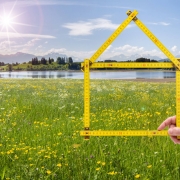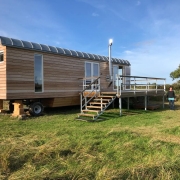Everything You Need to Know About Mobile Home Lot Rent
Have you ever imagined what it would be like to live in a manufactured or mobile home? This is becoming an increasingly popular choice among modern homeowners, and for good reason.
Mobile homes allow you to enjoy all of the amenities you love, at a price point you can afford. Plus, the latest models come equipped with some of the most high-tech comforts around, including energy-efficient upgrades.
Many prospective buyers are curious about how the mobile home lot rent process works. Today, we’re breaking it all down and sharing all the details you need to know.
How Does Mobile Home Lot Rent Work?
Lot rent is also known as a lot lease payment. Put simply, this is a rental or lease contract that you will enter into when you’re ready to live on a particular parcel (or “lot”) of land.
This will be the lot where your mobile home is located. At a pre-determined time each month, you will pay your rental fee to the property owner.
You might be wondering why this fee is charged separately. Shouldn’t it be included in the home loan that you take out to purchase your manufactured home? Not always.
In most cases, homeowners will work with their lender to take out a loan that pays for the physical structure of the mobile home itself. However, if you take up residence in a mobile home community, the land that your home sits on will usually be owned by a separate party.
Instead of buying that land outright, you will lease it from the property owner.
Who Do I Pay?
The person who will receive your monthly lot payment is known as the community manager or property manager. Instead of addressing your payment to a specific person, you’ll usually just send it to the front main office, and they can take care of the rest!
What’s Included in My Rental Payment?
When you pay the lot rent on a mobile home each month, you should know exactly what your payment is going toward. While the specific terms that you set up with your property owner might vary, there are a few elements that most rental fees are designed to cover.
Let’s take a look at some of the most common ones.
Amenities
Does your mobile home community come with any special perks or amenities for residents? Examples may include:
- Garbage pickup services
- Cable TV
- Internet access
If so, your monthly rental fee may go to pay for those services.
Utilities
Most of the time, community owners will consolidate residents’ monthly utility payments into their lot rent fees. Take note of which bills you pay separately, and which ones you don’t. For instance, if you don’t see a water bill each month, those services are likely rolled into your lot rent.
If you’re not sure which utilities you’ll pay out of pocket and which ones are included in your rent, you can always ask the property manager!
Community Maintenance and Upkeep
Manufactured or mobile home communities are just like any other neighborhood. Residents want and deserve streets that are clean, landscaping that looks neat, and shared-use buildings (like the clubhouse or pool) that are spacious, well-kept, and tidy.
Property managers may use your lot rent to help pay for these services. For instance, they might go toward the cost of employing a groundskeeper, making minor repairs, or hiring a weekly cleaning service.
Major Maintenance and Upgrades
Often, repairs are minimal around a mobile home park. Yet, there are times when property owners will need to make changes that are more expansive and expensive.
Examples might include:
- Repairing or replacing roads and sidewalks
- Installing or repairing water or sanitation pipes
- Expanding the property to accommodate more units
- Installing or mending the front gate
How Much Will It Cost?
If you’re already paying a mortgage or rent on a mobile home, you naturally need to budget for the cost of your lot rental. Unfortunately, there isn’t a universal price that applies to every lot. There are a few different factors that will affect how much you can expect to pay, so let’s take a look at each one.
Your Geographic Location
Often, the amount you’ll pay will depend in large part on where you live. In certain geographical areas, property owners can command higher prices for rent than others. This is especially the case in big cities like New York City, Los Angeles, and Boston.
In major metropolitan areas, housing options can be scarce. As a result, prices tend to trend upward. If you live in one of these locations, you can expect to pay more for your mobile home lot than someone who lives in a more rural spot.
The Type of Mobile Community You Live In
Your lot rent may also fluctuate depending on the exact type of mobile home community you live in. If yours is filled with feature-rich amenities such as a clubhouse, swimming pool, exercise facilities, and walking trails, then your monthly amount will likely be higher.
It’s smart to go ahead and crunch the numbers to make sure you can afford the purchase you’re considering. When you need to conserve costs, take a look at the amenities that a potential community offers. If you can do without some of the most high-end perks, you might be able to save money by living elsewhere!
Learn More About Mobile and Manufactured Homes
Whether you’re planning to move soon or you’re just eyeing the market, it’s a good idea to understand what a mobile home investment can entail.
Now that you know a little more about how mobile home lot rent works, are you ready to take a few steps forward? As you learn more about this exciting real estate sector, we’re here to help!
Check back often for more advice, insights, and guides related to mobile and manufactured homes. We can even help you find mobile home parks near you, so let’s get started!


